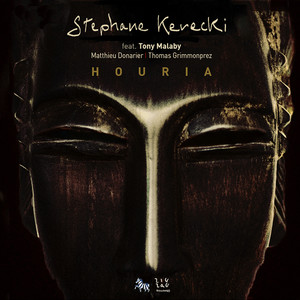
Houria
- 流派:Jazz 爵士
- 语种:纯音乐
- 发行时间:2009-04-01
- 类型:录音室专辑
- 歌曲
- 时长
简介
It is one thing to make music of limpid beauty, another to make music of high-tensile muscularity. It is something else again to combine both qualities in such a way that each enhances the other. But that is what the French bassist and composer Stephane Kerecki has done with the third album by his trio, augmented for the occasion by the American saxophonist Tony Malaby. \rThe French, who even under Nicolas Sarkozy possess a public subsidy system for the arts which is the envy of everyone except the Scandinavians, are able to scatter prizes and grants around like confetti. So it is not remarkable in itself that Houria was nominated for one of the country's many jazz gongs. The category, however, in the Victoires du Jazz 2009 awards, was unusually apt: Instrumental Revelation. \rHouria is indeed a revelation. Not so much for the instrumental performances, though these are about as close to perfection as it is possible to get, more for the realization of Kerecki's concept for the project. This was, he writes in the liner notes, the idea of a "tribal music reconciling primitive rhythms and contemporary harmonies" (in France, "primitif" does not reveal the same cultural arrogance "primitive" would betray in Britain or North America). The album is a synthesis of African dance/trance rhythms and modern jazz and classical harmonies, a synthesis so subtle and symbiotic that to call it fusion would be to insult it. \rParallel to his jazz activities, Kerecki has spent five years playing with the Algerian singer Jamel Allam, and most of the tracks on Houria (which means "freedom" in Arabic) are structured on, or at least begin with, Maghrebi rhythms. It is also, as the mask on the front cover suggests, infused with sub-Saharan rhythms. Neither is used to create simple, reiterative beats and grooves, but shape-shift throughout Kerecki's arrangements. They provide weighty centers of gravity for saxophonists Malaby's and Matthieu Donarier's improvisations, and, less frequently, those of the wonderfully sinewy but supple drummer Thomas Grimmonprez and Kerecki himself. \rMalaby is an outstanding addition to the group. His tenor solos on the highlife-tinged "Macadam" and the gentle "Un Ange Passe"—the first strewn with broken notes, the second gentler and dreamier—are terrific; so too is his soprano work on "Houria," which begins with a bass ostinato paying homage to "Upper Egypt & Lower Egypt" on saxophonist Pharoah Sanders\r' Tauhid (Impulse!, 1967), the enduring early masterpiece of North African/jazz cross-fertilization. Malaby's soprano takes on a rougher, vocalized edge for the funky "Palabre," the only track featuring a more or less continuous ostinato. Donarier is delightful too, particularly on soprano, and he turns in a memorable, almost Ben Webster-ish tenor solo on "Fable." \rThe use of the reedy soprano—used on most tracks by one of the saxophonists while the other plays tenor—lends an overtly Maghrebi air to some of tunes. So too does Donarier's tapping of the tenor's pads on "Houria," which evoke the percussive sound of the Moroccan guimbri lute, a staple of gnawa trance music. Grimmonprez also recreates African sonorities on his drums, most notably on "Macadam," where he introduces the sound of a water drum to his kit. Mostly though, Africa is embraced by its rhythms rather than its instruments. \rThe disc closes with three lovely, peaceful tunes—an arrangement of Olivier Messiaen's "O Sacrum Convivium," the brief Malaby-Kerecki improvisation "Duo 3," and the quietly rhapsodic "Secret D'Oreille." \rA gorgeous, uplifting disc from start to finish.

